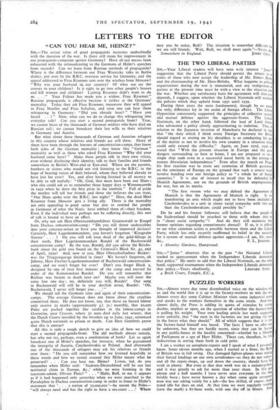THE TWO LIBERAL PARTIES Sne,—Your Liberal readers will have seen
with interest " Janus,• suggestion that the Liberal Party should permit the return to it, ranks of those who now accept the leadership of Mr. Ernest Brew, and the chairmanship of Mr. Hore-Belisha. What happens to political organisations during the war is immaterial, and any realignment of parties at the present time must be with a view to the situation after the war. Whether any satisfactory basis for agreement will then exist depends, I suggest, upon whether the Liberal Nationals still mains the policies which they upheld from 1931 until 1939.
During these years the most fundamental, though by no means the only, difference lay in the realm of foreign affairs. The liberal Opposition consistently supported the principles of collective security and mutual defence against the aggressor-States. The Liberal Nationals, on the other hand, followed the lead of Lord Simian, who advocated a policy closely approximating to isolation. Thus, in relation to the Japanese invasion of Manchuria he declared in 1932 that " the duty which I think every Foreign Secretary for Britain should regard as resting on his shoulders is so conducting his pan of the matter as not to involve his own country in a situation which could only extend the 'difficulty." Again, on June 23rd, .1936, he stated that " With the present situation in Europe and the grave dangers surrounding us here at home, I am not prepared to see single ship sunk even in a successful naval battle in the attempt to restore Abyssinian independence." Even after the march on Prague his first reaction was to resist any extension of British guarantees on the continent of Europe on the ground that such a course would involve handing over our foreign policy to " a whole lot of foreign
countries." It is also of interest to recall that he defended the Munich Agreement, not on the grounds of British unpreparednets for war, but on its merits.
" The first reason why we may defend the Agreement d Munich is that the Agreement of Munich is right. It was transferring an area which ought not to have been included in Czechoslovakia to a unit in closer racial sympathy with this area than the Czechoslovakians could possibly be."
Do he and his former followers still believe that the people d the Sudetenland should be attached to those with whom they are
in " closer racial sympathy "? And do they still maintain thei former opinions regarding commitments abroad? If so, it is difficult to see what common action is possible between them and the Liberal Party, which has only recently reaffirmed its belief in the necessity for a system of mutual defence against aggression.—I am, Sir, yours


























 Previous page
Previous page